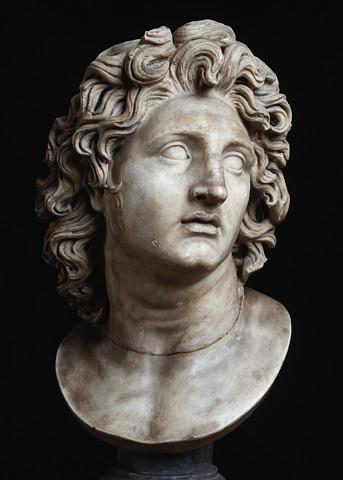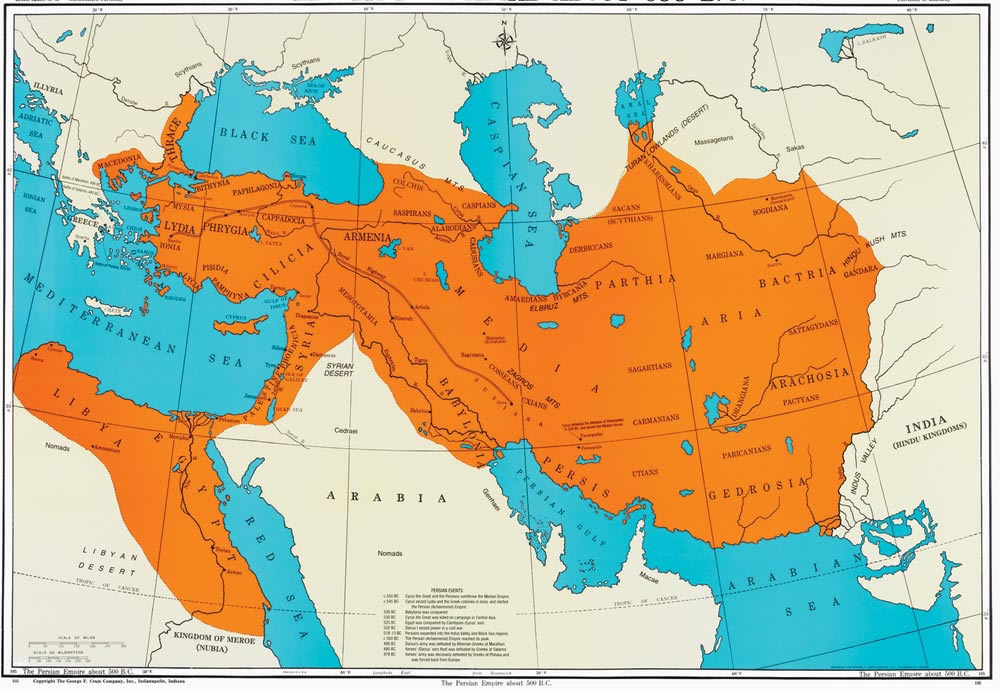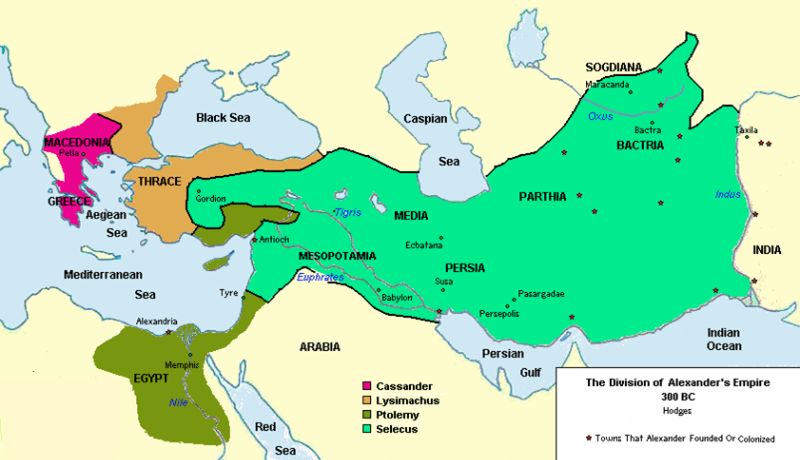

In this article we are going to talk about a defining moment in western history. It is a moment that we will call the "totalitarian revolution in ancient Greece." This was the transition of ancient Greece from a small collection of quarreling states to a system of world empire dominated by two giant empires: the Ptolemaic Empire and the Seleucid Empire. This was the shift from the "polis" to the "cosmopolis," the beginning of the Hellenistic Age.
In order to understand this historic moment, we must first tackle a few modern misconceptions. Contrary to what is taught in classrooms today, it was not Athenian democracy that put Greek culture on the world map. It was a series of conquests by one of the most incredible leaders to step onto the stage of world history. It was Alexander the Great (356 BC - 323 BC) of Macedon who forged the Hellenistic Era, and put Greece on the map as a world power.
But if we are to understand how this happened, we need to have a basic understanding of Greek history.
DEMOCRATIC ATHENS WASN'T A GEOPOLITICAL SUPER POWER IN THE 4TH CENTURY BC
PERSIA WAS

(A Map of the Persian Empire)
Athens and its democracy was not a major super power in the ancient world. At the time of Athenian Democracy (between the 5th and 4th centuries BC) it was actually Persia that was a major world super power, which was a geopolitical colossus of the first order, stretching from the Mediterranean to the Himalayan Mountains in India and Pakistan.
The map above basically summarizes the relationship between Greece and Persia before the Hellenistic Era. Persia was a major super power. Greece was not. Many modern history books try to frame the relationship between Greece and Persia as some kind of Cold War. But nothing could be further from the truth. The ancient Greek and Persian cultures did not exist in isolation. There was a cross-fertilization of cultural influences upon both sides.
The reality is that the Greek states fought one another just as often as they fought Persia. We should also mention that travel between the Greek states and Persia was free flowing. For example, the Greek historian Herodotus traveled within Persia. Another key example is that in the Battle of the Granicus — the first of three major battles that Alexander the Great would fight against the Persian Empire — the Persian troops were led by the Greek Mercenary, Memnon. And most notably, in the Peloponnesian War (431-404 BC), when Sparta fought Athens, Sparta received financial aid from the Persians.
So it is important to understand that the relationship that the various Greek city-states had with Persia was much more complex and porous than modern history presents.
THE SUICIDE OF DEMOCRACY IN ATHENS

Greek history was not defined by a quest for freedom as some would suggest. It was not a quest to make Greece safe for freedom and democracy against the Persians. This is the kind of idea that is perpetuated in popular fiction, like the 300 movies. Throughout most of ancient Greece's history, a majority of the Greek city-states did not exist under democracy. And it is not very clear that democracy in Athens was even much of a real democracy at all. A majority of the Athenian people did not have the right to vote. To vote one had to be an adult male who owned land and was not a slave. And the number of these voting citizens varied between 30,000 and 50,000 out of a total population of around 250,000 to 300,000. (Thorley, J., Athenian Democracy, Routledge, 2005, p. 74). So this wasn't really much of a democracy at all.
Athenian democracy was short lived, existing for about two centuries. It started in around 508 B.C. and ended around 323 B.C.
Democracy in Athens got started in 508 BC, which led to the Classical period. It was during the Classical period that structures such as the Partheon were built. Much of today's democratic Western culture has been inspired by Classical Era Athens. A prime example is the architecture of Washington D.C. Much of the philosophy and theatre that flourished during the Classical period would also become influential later on in Western civilization.
But eventually Athenian democracy ended up committing suicide. How it ended up committing suicide is highly relevant to today. There was the emergence of a deceitful megalomaniac, Pericles, an influential Greek Statesman, orator and general of Athens during the Peloponnesian wars. He proclaimed a so-called "golden age" of Athens. Now Pericles was very similar to American imperialist leaders in the modern era such as Woodrow Wilson, Roosevelt, George Bush and and other people like this who spread their imperialism by pretending to spread freedom.
Pericles claimed he wanted to make Greece safe for democracy, but it was democracy on the terms of Athens via the Delian league, and people who didn't want to be subservient to Athenian imperialism were crushed. In order to achieve this goal of spreading Athenian style democracy, Pericles started the largest and most disastrous war in Greek history in an effort to knock out the other major power in Greece, he started a war with Sparta. This campaign was a complete catastrophe. Sparta ended up winning. Pericles ended up dying of the plague. There were also serious allegations of corruption against Pericles, but the whole situation ended in disaster and this was the end of Athens as any kind of major power in Greece. It was Thucydides (a major historian of the Peloponnesian war) who said that it was a political defeat as well as a military defeat. Athenian democracy was completely discredited as anything in terms of a credible political system.
THE EMERGENCE OF MACEDON AS A MAJOR GREEK POWER
ALEXANDER THE GREAT BRINGS GREECE ONTO THE WORLD STAGE
Out of the self-destruction of Athens would come people such as Plato and Aristotle, who utterly despised Athenian democracy. Also, out of the ashes of that situation, and out of the fact that both Sparta and Athens had severely weakened each other by getting into a bloody war, Macedon, a state at the periphery of Greek civilization, ended up taking over Greece.
Now normally it would've just stopped there and there would have been a new set of masters for Greece, except for the arrival on the stage of history of one of the most extraordinary, as well as one of the most brutal military geniuses in history: Alexander The Great (356-323 BC).
Alexander the Great decided that he wanted to conquer the Persian Empire, which on the face of it was completely mad in terms of his military resources vis-à-vis the Persians military, but like many maniacs in history, he wouldn't listen to anyone who told him how unrealistic this was. And he went and conquered Persia in a series of stupendous military victories. The military revolution of Alexander the Great created a major turning point in world history.
It is important to understand that when Alexander the Great launched his campaign against Persia, Athens supported Persia, and that sort of sums up where democracy was at in that time in history.
ALEXANDER'S TRIP TO THE OASIS OF SIWA AT THE TEMPLE OF AMMON
ALEXANDER IS PROCLAIMED A LIVING GOD

Not only was Alexander the Great a sophisticated military conqueror, but in some places he was declared a living God.
In 332 B.C, Alexander the Great arrived with his armies in Egypt after winning a set of stunning military victories against the Persians. In particular was the Battle of Issus (in what is modern day Turkey), that had resulted in the fleeing of King Darius III from the battlefield. Many historians (such as Arrian) state that this battle marked the beginning of the end for the Persians, and the rise of Hellenic power.
According to the historian Siculus, Alexander received a friendly reception by the Egyptian people because they had not been treated very well by the Persians.
"Alexander marched on to Egypt and secured the adhesion of all its cities without striking a blow. For since the Persians had committed impieties against the temples and had governed harshly, the Egyptians welcomed the Macedonians (Siculus)."
In fact, he was even crowned Pharaoh of Egypt in Memphis on November 14, 332 B.C. They gave him the crown of Upper and Lower Egypt, and named in the incarnation of Ra and Osiris.
From what we can tell in historical accounts, Alexander seemed to be very open to Egyptian religion and traditions. Arrian says the following about his stay in Egypt:
"[Alexander] crossed the stream and came to Memphis; where he offered sacrifice to Apis and the other gods, and celebrated a gymnastic and musical contest, the most distinguished artists in these matters coming to him from Greece (Arrian)."
But one of the stranger events in Alexander's stay in Egypt was his journey to the temple of Ammon at the Oasis of Siwa. He had a desire to go to this temple because the Oracle of Ammon was said to be exact in its information, and Perseus and Hercules were said to have consulted it (Arrian). In addition to having a desire to emulate Perseus and Hercules, he also was interested in his own pedigree. Just as Perseus and Hercules were the son of Gods, he also believed that this was his situation.
However, anyone who understands the geography of ancient Egypt knows that this was a mind-boggling decision. The Oasis of Siwa is in modern-day Libya, it is very hard and dangerous to get to. One has to travel along the coast and then they have to travel across one of the most barren parts of the Sahara desert to this oasis. It is a very dangerous trip.
When Alexander made this journey, he left most of his army in Egypt, while taking a few friends, companions and guides. Now when Alexander made this journey, his party ran out of water after four days, according to Siculus. But then Siculus says the group was saved by a great storm of rain from the heavens, a rescue that he said seemed to have happened by "divine providence."
Eventually Alexander and his party did make it to the temple, and they were greeted with a very warm reception.
Plutarch says that according to his sources, Alexander was met by the Siwan high priest who greeted him with the words "O, paidion", "Oh, my son", but mispronounced the Greek as "O, pai dios" meaning "Oh, son of god", much to Alexander's delight and amazement. (Plutarch).
FROM THE POLIS TO THE COSMOPOLIS

As a result of Alexander's conquests, Greek society made a transition from the polis, the narrow-minded Greek polis of limited political views, to the Cosmopolis, the world state. When Alexander conquered Persia he took over the administrative structure of imperial Persia and combined that with Greek ideas. So this became a world state, a multicultural world state, and a fusion of cultures.
Alexander the Great was successful in creating an empire that stretched from Ancient Greece to Pakistan and Afghanistan. However, while he was a great conqueror, he was not so good at succession planning. When asked who he would leave this great, sprawling empire to, the story goes that he said, "To the strongest!" As a result, when he died at the young age of 32, his empire quickly split into four different empires under his generals.
While Alexander's physical empire did not remain intact, he had successfully spread the cultural legacy of Greece throughout the ancient world. He had transformed Greece from the polis to the cosmopolis. This created the Hellenistic Era. So this is an extremely significant turning point in history.
WHY THIS IS RELEVANT TODAY

Now what is significant about this for today's world is that as American democracy continues to decline. America is approaching a period in history that is similar to that of democracy in Athens. This is a system that really cannot go on much longer in its current form, and under Bush and Obama, under the pretense of supposedly fighting terrorism, there was nothing short of a totalitarian legal revolution in America moving America towards a system of totalitarianism. The problems underneath American society and the world system it's helped create, the environmental problems, are many times worse than any of the problems faced by ancient Greece and Athens, as well as the whole house of cards debt situation.
So the transition to an authoritarian cosmopolitan world, the potential for that to happen is actually greater in the current system, than it was under the time of Athens. And the brutality of the leaders to come is likely to be much greater. In studying 20th century totalitarianism, people will correctly say that somebody like Stalin for example, is a very brutal person and that he murdered millions of people, many of them for totally silly reasons. However, what people miss in situations like this is that when things get disorderly, the leaders who come to power have to be brutal. It's a kill or be killed situation, and that is a portent of what is to come. It happened in Greece and it could happen today.
RELATED LINKS
MORE WORLD FUTURE FUND ARTICLES
Choosing death before dishonor.
Socrates' final speech before the Athenian Democracy forced him to commit suicide.
Quotations from Political Philosophers
Read quotations from famous historical leaders and philosophers to get an understanding of long term history.
PRIMARY SOURCES ON GREEK HISTORY
Herodotus is a Greek historian who lived in the 5th century, and was a contemporary of Socrates
"The History of Herodotus" also known as "The History" is now considered the founding work of history in Western literature.
Written in 440 BC, "The History" serves as a record of the ancient traditions, politics, geography, and clashes of various cultures that were known in Western Asia, Northern Africa and Greece at that time.
While it is not completely impartial, it is important as a source of information about that time period, and is important as a work that established the genre and study of history in the Western world.
Lives of the noble Grecians and Romans by Plutarch
Plutarch (46-120 AD) was a Greek biographer and essayist (who became a Roman citizen) and wrote about the lives of many notable Greeks.
PRIMARY SOURCES ON ATHENIAN DEMOCRACY
A thorough sketch of Athenian history and government written by The School of Aristotle in 330 BC
Politcs: A Treatsie on Government by Aristotle
A work of political philosophy by Aristotle
PRIMARY SOURCES ON THE PELOPONNESIAN WAR
The History of the Peloponnesian War by Thucydides
SPARTA
WORKS BY PLUTARCH
Plutarch (46 - 120 AD) is a Greek biographer and essayist who wrote about the lives of ancient Greeks and Romans.
Now keep in mind that Plutarch lived centuries after the Spartans that he writes about.
And since he admired the Spartans greatly, it is possible that he exaggerated some of the things he wrote.
However, his works are still very important because the Spartans themselves did not write any history about themselves prior to the Hellenistic period, or if they did write anything, it has been lost.
The Ancient Customs of the Spartans by Plutarch
Sayings of Spartans Sayings of Spartan Women
WORKS BY XENOPHON
Xenophon (430-354 BC) of Athens was an ancient Greek historian, soldier, mercenary and student of Socrates.
As a historian, Xenophon is known for recording the history of the time, and some of his writings are about Sparta.
Despite being an Athenian citizen, Xenophon is often associated with Sparta. He served under Spartan generals in the Persian campaign. He also had a friendship with King Agesilaus II of Sparta
In this work Xenophon has a chapter on the "Constitution of the Lacedaemonians" (the Laecedaemonians are what the Spartans were called at the time).
Xenophon on the Spartans The Education of Spartan Mothers
ALEXANDER THE GREAT
ANCIENT HISTORICAL SOURCES ONLINE
Plutarch: The Life of Alexander
The Library of History of Diodorus Siclus
OTHER ONLINE SOURCES
Alexander the Great Alexander of Macedon Biography (History of Macedonia)
Alexander the Great in Egypt (Tour Egypt)
Alexander in the Oasis of Siwa (Greece)
Siwa Oasis (Wikipedia)
Alexander Visits Siwa (Livius)
Temple of Amun, Siwa Oasis, Egypt (Places of Peace and Power)
BOOKS
Hellenistic Lives: Including Alexander the Great, by Plutarch (Google Books)
The Correspondence Between Aristotle and Alexander the Great (Google Books)
Alexander the Great, Son of the Gods (Google Books)